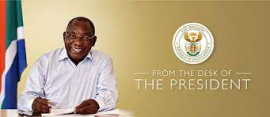
PRETORIA, July 3 (NNN-AGENCIES) — President Cyril Ramaphosa says it is critical that South Africa remains on par with other countries that have taken steps to incentivise manufacturers to invest in the production of electric vehicles in the country.
This after global auto manufacturer BMW announced that it will be investing some R4.2 billion to equip its Rosslyn Plant in Tshwane to build the next generation BMW X3 hybrid plug in vehicle.
This will be the first locally produced electric vehicle to be produced on South African soil.
President Ramaphosa emphasised that government, civil society, business and labour must work together to ramp up production of these vehicles to secure the future of the auto manufacturing in the country in the face of decarbonisation.
“Among other things, this means that auto manufacturers need to be supported to expand their investment in the production of new energy vehicles in South Africa. We currently have a range of measures to support automotive manufacturers, such as the Special Economic Zone incentives, the Automotive Investment Scheme and others.
“We will soon be finalising a strategy to support the transition to electric vehicle manufacturing that is affordable and effective. It is key that South Africa keeps up with other countries, including on the continent, that are incentivising the manufacture and uptake of electric vehicles as the world moves towards decarbonisation,” the President said on Monday in his weekly newsletter.
Across the globe, countries – particularly those in the global North – are beginning to implement or mull carbon taxes on imports and this may have severe implications for local exporting industries and jobs in the future.
Ramaphosa said in light of this, South Africa’s Just Energy Transition Investment Plan (JET IP) is critical to “direct resources both to supporting workers, communities and industries affected by the shift towards renewable energy sources, and to investing in new industries like green hydrogen and electric vehicles”.
“This is particularly important as many of our export markets are increasingly seeking to reduce the negative environmental impact of the goods they produce and import. The European Union, for example, has decided to ban the sale of new petrol and diesel-powered motor vehicles from 2035.
“This has significant implications for South Africa since Europe accounts for about 60% of our motor vehicle exports. This presents both a threat to our auto industry, which mainly produces petrol and diesel vehicles, and an enormous opportunity,” he said.
The opportunity, Ramaphosa explained, lies in the mineral resources of the country.
“South Africa has some important advantages. We have the world’s largest reserves of platinum and are an attractive location for renewable energy, both of which are important elements in the production of green hydrogen. Such hydrogen can be used as an e-fuel in some models of vehicles, which are exempted from the EU ban,” he said.
The President reiterated government’s stance that despite uncertainty around decarbonisation and how this will be translated in just and equitable manner, it is an opportunity to “grow and diversify our economy and create employment”.
“The decarbonisation of our society can be used to drive growth, improve industrial competitiveness, create jobs and harness the potential of innovation.
“Whether it is in the auto industry, energy or other economic sectors, we are confident that our country is taking the necessary steps towards a low-carbon future that leaves no-one behind,” President Ramaphosa said. — NNN-SANEWS






